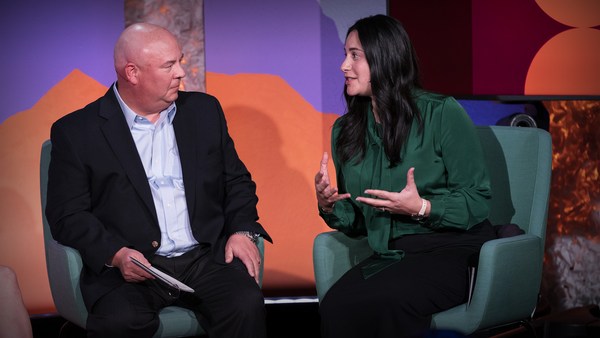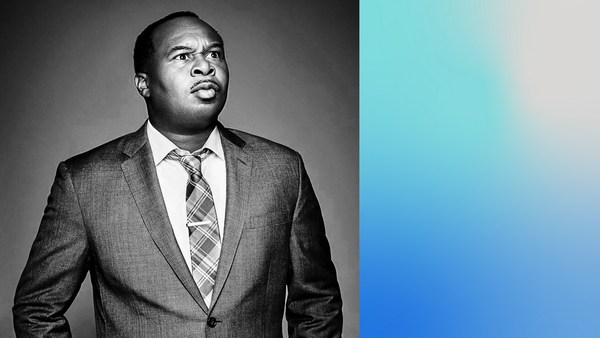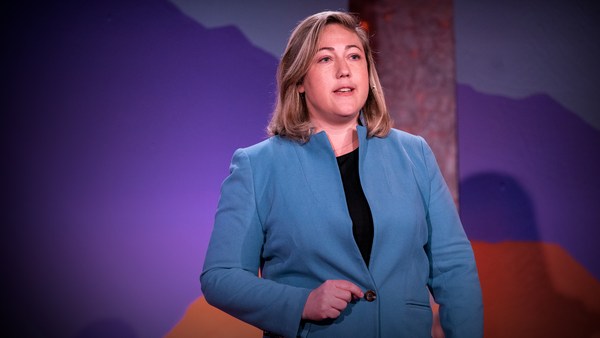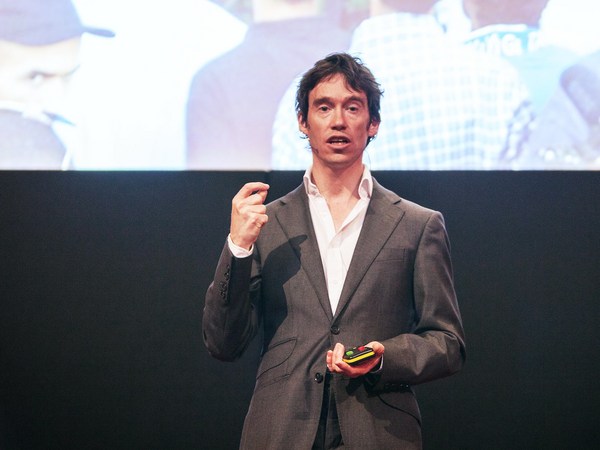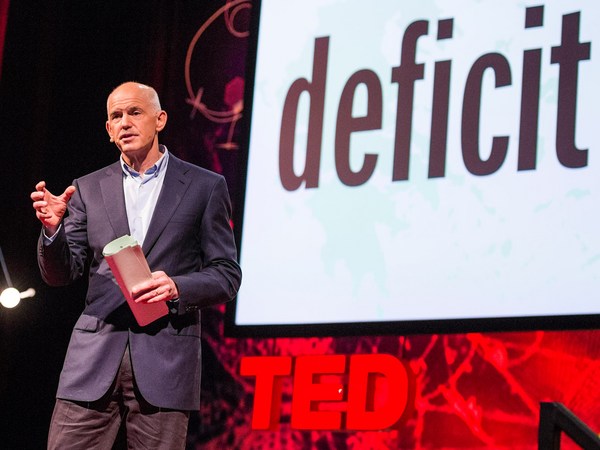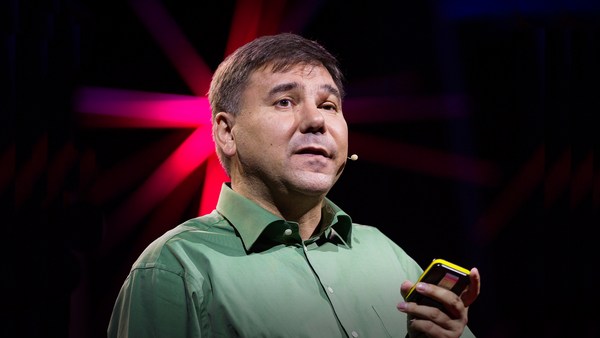When TED asked me to be a part of this democracy event, I was flattered. When they told me it was a pro-democracy event, I paused. Like, really? We still think this is a good idea? Giving everyone a voice? Have you talked to everyone? One in 10 Americans believe chocolate milk comes from brown cows. We want those people weighing in on foreign policy.
Because if democracy is hearing from the voice of the people, consider me skeptical of that conversation. Because I think we're incapable of having it. Any conversation. And not just in America, globally, we're tuning people out. Frankly, we're bad at talking to other people.
Didn't always used to be this way. In the old days, it came naturally. We would talk to folks, we would negotiate over food or child care. So your kid didn't get eaten by a bear or run off and invent fire. But since then, it's gotten harder, more difficult. Screens have placed an impediment between people and thought. Partisanship has made talking to someone outside of your own POV traumatic. Now, talking to somebody with a different point of view than yourself is to be avoided at all costs. It's like paying taxes. Like, you should do it, but if you can avoid it, makes you smart.
(Laughter)
It's an awful time for conversations, so much so that even right now I've opted for a lecture.
(Laughter)
I won't be taking questions.
(Laughter)
I find it easier to speak at you.
(Laughter)
So how did we get here? Well, as someone in their 40s, I'm legally obligated to point the finger at social media. The cultural conversations we have are dictated by the forums we have them in. And all those forums, they just push us towards short, loud outbursts. Maximum volume, short duration. Now, even right now, this TED Talk is only seven minutes. I remember when TED Talks used to be 18 minutes long.
(Laughter)
Now you have to communicate the economics behind climate catastrophe in the time it takes for a potty break. Not great guys, not great.
(Laughter)
I remember the good old days when TED Talks used to be “Theodore Discussions.” You know, a year from now, they're just going to be T's GIFs.
(Laughter)
So how do we get better at talking to one another? If democracy depends on discourse, on compromise, how do we have civil conversations? Well ... The long answer is destroy the bias of social media and the cesspool of misinformation that is propagated by the entertainment machine that dominates our politics and discourse. I could tell you how to do that, but TED only gave me seven minutes, so sorry. Maybe next time, it would have cleared everything up. But in the four minutes, wow, the four minutes we have left, I'll give you a few tips of what you can do now. So, three tips for how to be slightly better at talking to a human you disagree with.
One, read a book. Easy. You know, you're not as smart as you think you are, get inside the head of someone else. And make it a long book. We need to expand our attention beyond just TikToks.
Two, travel. Mark Twain said it best. You know, bias is reduced by travel. It's the easiest way. As a kid who grew up in Michigan, I hated Ohio. And then I traveled there, and you know what? I still hate Ohio. But now I know what Akron smells like. So I guess, progress, I think?
And three, concede something. That's a biggie. Concession. You have to give something up. You're not as smart as you think you are. Concession is crucial to democracy. To concede comes from the Latin “consensus,” which means to find agreement. And if you challenge me on that, I would concede.
(Laughter)
Because I totally made that up.
(Laughter)
That's how this thing works, you know? Even upstanding, charismatic people like myself are full of shit.
(Laughter)
Like many of us, I find my desire to be seen as smart outweighs my desire to shut up when I don't know what I'm talking about. It's hard for Americans to shut up when they don't know what they're talking about. When you make politics a sport, then everything becomes win or lose, every conversation becomes a negotiation over field position. Our guards are up. We're defensive, we're afraid of getting punched in the face. We think our strongest weapon is our certainty. But the most relatable thing about us is our failure.
Has no one here been to therapy? It's all there. And democracy in a bipartisan country is like a marriage. And in America, we are at the couple's counseling phase. America, you've made some mistakes. Republicans, maybe vaccines aren't the work of the devil. Democrats, maybe Portland does suck.
(Laughter)
Canada, Canada, it's 2023, you can’t call your police “Mounties.” Alright? We're imperfect, we have to accept that. It's hard to say you don't know. But it can also be liberating. Like, I don't know how to throw away batteries, I don't.
(Laughter)
I don't know what "40 percent chance of rain" means. Does it mean it's 40 percent chance it will rain or that it’s going to rain, only 40 percent chance as hard? I don't know, I don't know, I don't, but it's liberating. We need to, we need to concede a little on everything. Except for gun safety reform. That's a no-brainer. But everything else -- And climate. See, it's tough.
(Laughter)
It's hard, it's hard. We're not very good at it. It's not popular to concede. In America, there's a big chunk of the population right now who hasn't conceded the last presidential election. It's hard to give any ground when you can't agree that the Earth you stand on is either round or flat. But, but, perhaps a gesture of understanding, if not towards irrefutable facts, but to your own uncertainty is a step towards progress. I think the phrase “I don’t know” invites a softening, and the ground is too hard to grow much of anything right now.
What I think, in order for American democracy to survive, we need a culture of vulnerability, or at least a space in that culture for vulnerability. The good news is, being wrong is sexy. Failure is an aphrodisiac. Every person who has ever loved me has told me how much of a loser I am.
(Laughter)
The proof is in the pudding. And if conceding is too much for you, if that feels weak, OK, don't think of it as conceding. Think of it as gamesmanship. You're setting a trap. Trap them with your vulnerability.
(Laughter)
Hypnotize them with your humility. Distract them with your failure. And as they begin to reveal themselves to you in your uncertainty, smash those fools.
(Laughter)
In the game of democracy, in order to win, we may have to start with a loss. But what do I know? I could be wrong.
Thank you.
(Applause)
